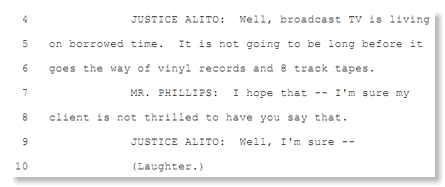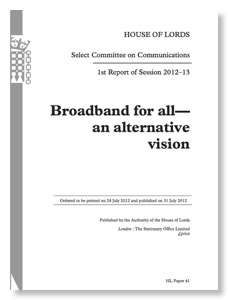A UK Alternative View on Broadband and the Future of Over-the-Air DTV
an alternative vision”. You probably did not see anything about it on US TV news programs, perhaps it was overshadowed by the Olympics. Or perhaps it was too troubling for the networks, or NAB, to address in a timely way. (As of this posting, NAB, CTIA, and Broadcasting & Cable have nothing about this report on their websites.)
(While we learned in high school and from Gilbert & Sullivan that the House of Lords consisted of hereditary peers, the scions of ancient dukes and earls, as a result of reforms in recent decades only 92 out of the present 775 members are hereditary peers, the rest being life peers appointed for life based on their own achievements.)
Here is the header from the article on the Daily Mail’s website:
The end of broadcast TV? House of Lords calls for all channels to go online (but you'll have to buy yet another box to watch them)
* Plan could see internet only TV service across the UK
* Report warns broadband speeds in rural areas will need to be improved before the move
The Daily Mail wrote
If you have only just managed to switch your TV to digital, bad news - you may soon have to buy yet another box.
A parliamentary inquiry today forecast a second wave of switchover as TV moves online.
The House of Lords says the government should begin planning for every channel to be available online to free up spectrum for services like high speed mobile phone services’.
Eventually the case for transferring the carriage of broadcast content, including public service broadcasting, from spectrum to the internet altogether will become overwhelming,' the Lords communications committee said in its report on internet infrastructure.
FCC sources report that the first draft of the National Broadband Plan had a discussion of reallocation from broadcast to broadband that was bolder than the final report but not as bold as this UK proposal. Within 30 minutes after the draft was given to the FCC Media Bureau, the Chairman’s Office started receiving calls from “The Hill” telling them to back off - such is the power of broadcasters in Washington!
Here is the text of the UK report that gives its controversial recommendation (para. 141)
We recommend that the Government, Ofcom and the industry begin to consider the desirability of the transfer of terrestrial broadcast content from spectrum to the internet and the consequent switching off of broadcast transmission over spectrum, and in particular what the consequences of this might be and how we ought to begin to prepare.
The UK report clearly recognizes that the switch would not be easy and that it should not be done until alternatives for media distribution are in place, operational, and affordable for all. But it recognizes the huge economic benefits of increasing broadband penetration - not just the benefit for certain industries, but for the whole society and economy.
The US National Broadband Plan has a key issue that is clearly missing, no doubt as a result of the political intervention on the first draft: If the US can achieve near universal penetration of broadband to US households by policies including making broadband the universal service equivalent of dial tone, why do we need over-the-air TV in populated areas. Indeed, if we are willing to use DBS for universal service-like video distribution, why do we even need over-the-air TV in rural areas?
Such a dramatic change has to be carefully planned and must respect the equities of the broadcasting industry. But is NBC in the business of pumping electromagnetic energy into the spectrum, most of which passes houses without any TV antenna, or is it in the business of putting together compelling programming that people want to watch and bundling that with compatible ads? Any such evolution must consider the needs of the economically disadvantaged and their right to continued access to “basic TV” as well as rural needs, but that is why FCC has had universal service programs.
Readers may recall a January post here with the following quote from Justice Alito during a Supreme Court oral argument:

What does Justice Alito and the House of Lords’ Communications Committee have in common? Appointments based on excellence in life accomplishments and life tenure. It would appear that officials without such life tenure are unwilling to raise serious long term questions of the public interest for even debate if they are unacceptable to strong trade associations.




![Validate my RSS feed [Valid RSS]](valid-rss-rogers.png)

